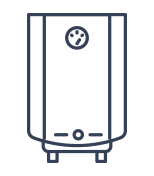As experts in boilers, we constantly receive questions about them. Naturally, people want to know the reasons why they should or shouldn’t purchase a particular model. What we intend to do here is reveal the pros and cons of combi boilers and conventional boilers. Then you will be able to make a more informed decision about which one you need.
Combi boilers
 We will begin by taking a look at combi models. They are high efficiency central heating and water heating units. You can expect them to provide the home with hot water and heat without requiring a separate water tank. They are typically smaller than other systems due to them merging both household functions into a single apparatus.
We will begin by taking a look at combi models. They are high efficiency central heating and water heating units. You can expect them to provide the home with hot water and heat without requiring a separate water tank. They are typically smaller than other systems due to them merging both household functions into a single apparatus.
The pros
Several excellent features come with these boilers and have made them some of the UK’s most popular. To start with, they are incredibly efficient. By replacing your current installation, it might be possible for you to save as much as £300 on your heating bills each year.
In addition, combi boilers are fast acting. Since there isn’t a water tank, you can acquire hot water on demand.
These boilers are safer as well. The cold water originating from these boilers is always ok to drink. It is fed from the mains directly. With traditional arrangements however, this isn’t always the case.
The cons
Now that you know some of the pros, it is time to move onto the cons. One major issue is that combi boilers rely on the mains pressure. For them to function correctly, this needs to be high enough. Prior to installing a new boiler, you should examine the mains pressure in your area.
Limited use is another disadvantage. A small combi boiler may struggle to supply hot water taps if you are filling a bath or having a shower. They are meant for smaller homes so may not be the right model if you have a larger home with several bathrooms.
The lack of immersion heater shall leave you without central heating and hot water when there is a break down too.
Conventional boilers
 Next, it is time to discuss the conventional boiler. These use a storage cistern that comes with two feeds. There is one for cold water and another for hot. These models are popular amongst larger households due to their efficiency.
Next, it is time to discuss the conventional boiler. These use a storage cistern that comes with two feeds. There is one for cold water and another for hot. These models are popular amongst larger households due to their efficiency.
The pros
The advantages include the fact that they operate even when the mains pressure is low. Moreover, the design is simple and it is not difficult to maintain them.
Another big advantage is they are compatible with older central heating arrangements. This makes them the best choice for homes that have these.
If the boiler breaks down, you have the option of installing an immersion heater to your hot water cylinder.
The cons
There are drawbacks to conventional boilers though. For instance, the pressure flow for hot water and showers can be low.
On top of this, you don’t receive hot water on demand either. You must heat it beforehand. That means there may be a delay in getting the supply. Hot water can run out as well, and take a while to reheat.
It is a requirement for you to have room for the cold and hot feed tanks too.
If you compare to the combi boiler designs, conventional ones are not as efficient. As you store hot water, there is going to be some heat loss.
More info about the pros and cons of combi boilers and conventional boilers
As you can see, each type of boiler works well in different situations but no device is without its disadvantages. It is best to look at your situation and decide which one suits you the most.
If you need any further guidance or advice, especially about the pros and cons of combi boilers and conventional boilers, you can always contact the team here at Warm. We are happy to help and will put you in touch with a local engineer.



